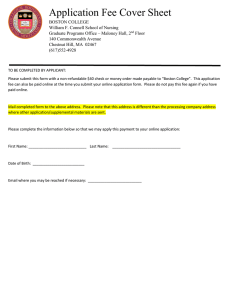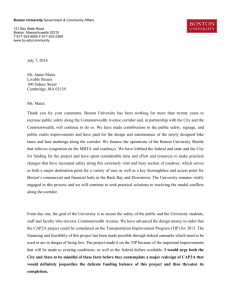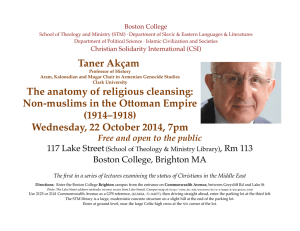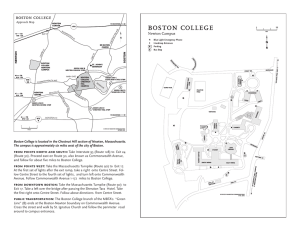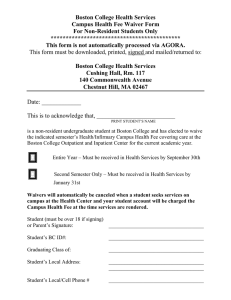boston college Institutional Master Plan Notification Form for Amendment
advertisement
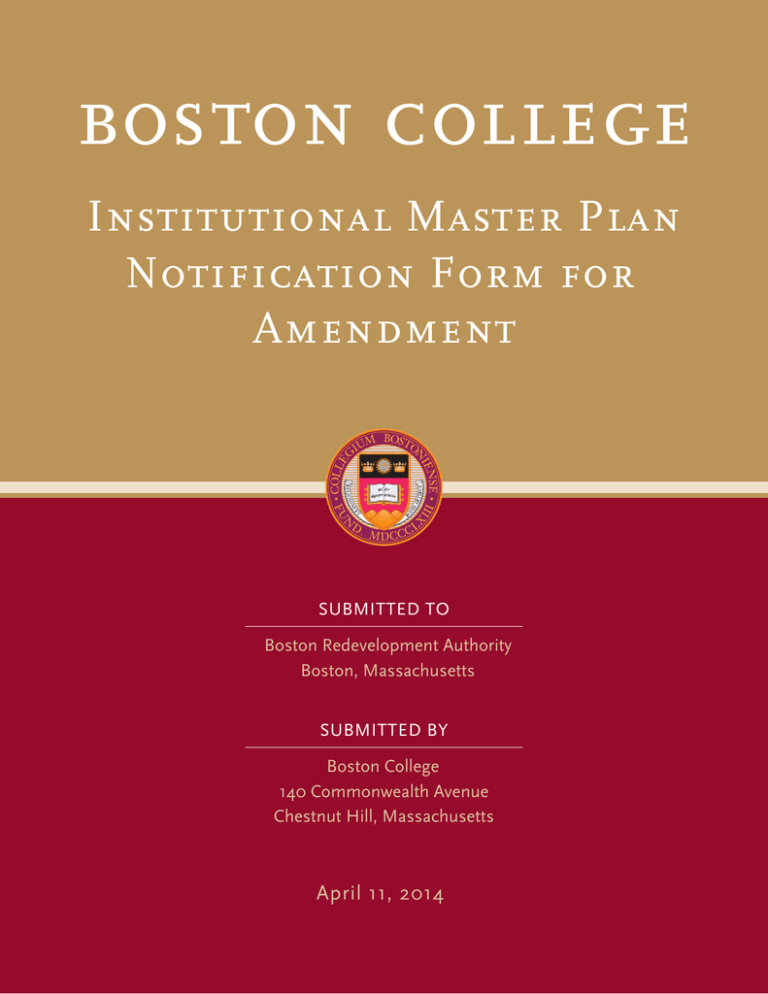
boston college Institutional Master Plan Notification Form for Amendment SUBMITTED TO Boston Redevelopment Authority Boston, Massachusetts SUBMITTED BY Boston College 140 Commonwealth Avenue Chestnut Hill, Massachusetts April 11, 2014 2101 Commonwealth Avenue IMPNF TABLE OF CONTENTS 1.0 Introduction .................................................................................................. 1 2.0 Boston College Mission and Objectives .......................................................... 1 2.1 Boston College Mission ........................................................................... 1 2.2 Major Programs and Initiatives ................................................................. 2 2.2.1 The Strategic Plan............................................................................ 2 2.2.2 The Campus Master Plan ................................................................. 3 3.0 Status of IMP Projects and Need for an IMP Amendment ................................ 4 4.0 Existing IMP.………………………………………………………………. ..................... 5 5.0 Amended IMP Proposed Institutional Project .................................................. 5 6.0 Expedited Review for Certain Small Projects ................................................... 6 Table of Contents 2101 Commonwealth Avenue 1.0 IMPNF INTRODUCTION In the spring of 2003, Boston College ("the University") embarked on a comprehensive strategic planning initiative to define the University’s needs and establish institutional goals for the coming decade and beyond. After several years of planning, a Strategic Plan was adopted by the Board of Trustees in February 2006. After working almost two years with the surrounding neighborhood, Boston College submitted an Institutional Master Plan Notification Form ("IMPNF") outlining the institutional needs of the University in December 2007. Based on the Scoping Determination on the IMPNF issued by the Boston Redevelopment Authority ("BRA"), Boston College submitted an Institutional Master Plan ("IMP") in June 2008. In subsequent Institutional Master Plan (“IMP”) filings with the BRA and the Boston Zoning Commission in January and March of 2009 respectively, Boston College changed the IMP in response to community concerns. The IMP was ultimately approved by the Boston Zoning Commission on June 10, 2009. The purpose of this document is to amend the IMP to reflect a proposed change for the 2101 Commonwealth Avenue Project (the "Proposed Institutional Project"). The Proposed Institutional Project as described in the 2009 IMP included the renovation of the 23,000 gross square foot ("gsf") building at 2101 Commonwealth Avenue as a conference and meeting facility. The Proposed Institutional Project as described in this IMPNF includes the renovation of 2101 Commonwealth Avenue for a conference and meeting facility and the McMullen Museum, which will be relocated from its current location in Devlin Hall. It also includes a new 7,100 gsf addition to the existing building for a museum entrance and circulation space for the museum. The Proposed Institutional Project will be called the McMullen Museum and University Conference Space. The proposed change described below meets the requirements for expedited review pursuant to Section 80D-9(2) of the Boston Zoning Code (the “Code”), Expedited Review for Certain Small Projects. 2.0 BOSTON COLLEGE MISSION AND OBJECTIVES 2.1 BOSTON COLLEGE MISSION Strengthened by more than a century and a quarter of dedication to academic excellence, Boston College commits itself to the highest standards of teaching and research in undergraduate, graduate, and professional programs and to the pursuit of a just society through its own accomplishments, the work of its faculty and staff, and the achievements of its graduates. It seeks both to advance its place among the nation's finest universities and to bring to the company of its distinguished peers and to contemporary society the richness of the Catholic intellectual ideal of a mutually illuminating relationship between religious faith and free intellectual inquiry. 1 2101 Commonwealth Avenue IMPNF Boston College draws inspiration for its academic societal mission from its distinctive religious tradition. As a Catholic and Jesuit university, it is rooted in a world view that encounters God in all creation and through all human activity, especially in the search for truth in every discipline, in the desire to learn, and in the call to live justly together. In this spirit, the University regards the contribution of different religious traditions and value systems as essential to the fullness of its intellectual life and to the continuous development of its distinctive educational heritage. Boston College pursues this distinctive mission by serving society in three ways: 1. By fostering the rigorous intellectual development and the religious, ethical, and personal formation of its undergraduate, graduate, and professional students in order to prepare them for citizenship, service, and leadership in a global society 2. By producing nationally and internationally significant research that advances insight and understanding, thereby both enriching culture and addressing important societal needs 3. By committing itself to advance the dialogue between religious belief and other formative elements of culture through the intellectual inquiry, teaching, learning, and community life that form the heart of the University. Boston College fulfills this mission with a deep concern for all members of its community, with recognition of the important contribution that a diverse student body, faculty, and staff can offer, with a firm commitment to academic freedom, and with a determination to exercise careful stewardship of its resources in pursuit of its academic goals. 2.2 MAJOR PROGRAMS AND INITIATIVES 2.2.1 THE STRATEGIC PLAN Each decade since 1975, Boston College has engaged in a comprehensive, long-range strategic planning process to guide its institutional vision. In February 2006, the Board of Trustees approved a Strategic Plan titled “Excellence, Distinction, Leadership: Boston College in the 21st Century,” which was the result of a two-year assessment and planning process that involved more than 200 faculty, students, and staff. The Strategic Plan calls for hiring up to 100 new faculty and adding several new academic centers and institutes as part of a 10-year $1.6 billion investment in the University’s future. The Strategic Plan developed seven strategic directions, each stemming from an existing strength and flowing directly from the 2 2101 Commonwealth Avenue IMPNF University’s mission, that distinguish Boston College from its peers in critical areas. These seven strategic directions include: 1. Commit Boston College to becoming the leader in liberal arts education among American universities. 2. Develop and implement a student formation program that will be a contemporary model for colleges and universities committed to student formation. 3. Identify and support selected research commitments that will achieve excellence and distinction in addressing urgent societal problems. 4. Commit targeted resources to selected natural sciences emphases that will establish Boston College as a national leader in these areas. 5. Build on the strengths and reputations of Boston College’s professional schools to establish leadership in critical professional areas. 6. Become a significant intellectual and cultural crossroads by leveraging Boston College’s international resources and partnerships, and its Jesuit and Catholic networks. 7. Become the world’s leading Catholic university and theological center. 2.2.2 THE CAMPUS MASTER PLAN Upon the completion of the Strategic Plan, Boston College hired the nationally respected campus architecture and planning firm Sasaki Associates of Watertown to help develop a long-range Campus Master Plan that would provide Boston College with an opportunity to achieve excellence by using the strength and distinctiveness of its campus to reinforce its mission and strategic objectives. The Campus Master Plan was designed to meet several goals for the campus based on the following guiding principles. Create One Campus—That the former Archdiocesan property become fully integrated with the Boston College campus, and that the 120-acre Chestnut Hill Campus, the 40-acre Newton Campus, and the 65-acre Brighton Campus each provide a notable setting that contributes to the campus learning environment and the life of the University. Develop Mixed Campus Uses—That Boston College’s campuses host a mix of academic, residential, and co-curricular facilities, and provide civic, 3 2101 Commonwealth Avenue IMPNF spiritual, and open space areas that foster a vibrant and engaged University community. Emulate the Character of the Middle Campus—That the new facilities on the Lower and Brighton campuses reflect the distinctive character of the Middle Campus with its combination of Gothic architecture and collegiate open spaces, linked quadrangles, and walkways. Provide Appropriate Campus Density—That campus development emulate the Middle Campus’ proportion of open space to building space, reflecting the Middle Campus height (4-5 stories) and open-space pattern, while respecting the character of the surrounding community. Promote Student Formation—That the Lower and Brighton campuses develop undergraduate student housing reflecting the University’s commitment to student formation that supports intellectual development and responsible student behavior in smaller living communities. Achieve Sustainability—That development on each campus achieve higher levels of energy efficiency and champion the natural environment, and that sustainability goals be carefully considered with each project. 3.0 STATUS OF IMP PROJECTS AND NEED FOR AN IMP AMENDMENT The Boston College IMP that was approved in 2009 lists a total of 17 Proposed Institutional Projects in the City of Boston that the University proposed to construct over a decade's time (see Table 5-2 of the IMP). Since the approval of the IMP, the University has constructed two of the projects. The University converted the 90,000 square foot Bishop Peterson Hall at 129 Lake Street into administrative offices for the University finances and human resources departments. The project was completed in October 2011 at a cost of $20.4 million. The University also renovated and expanded 2121 Commonwealth Avenue (formerly known as the Chancery) for office space for the University Advancement program. This project was completed in February 2012 at a cost of $21.1 million. A third project at 2150 Commonwealth Avenue was approved by the Boston Redevelopment Authority on October 8, 2013. This project will involve the demolition of St. Thomas More Hall and the construction of a new student residence and health center. Construction is anticipated to commence in Spring 2014 and be completed in Summer 2016. The 2101 Commonwealth Avenue site was approved in the Boston College IMP for re-use as a conference and meeting facility for faculty, staff and alumni. The IMP allowed further improvements and upgrades to this facility, including improvements to the kitchen and dining areas, to better support the planned use (as described in the 2009 IMP). 4 2101 Commonwealth Avenue IMPNF 2101 Commonwealth Avenue is being used for a conference and meeting space consistent with the 2009 IMP. However, the second and third floors are not ideally suited for meeting and conference facility use and are not as heavily used as the first floor. Consequently, it is now proposed to relocate the McMullen Museum to the second and third floors of 2101 Commonwealth Avenue and to incorporate an approximately 7,100 gsf entrance and circulation for the museum. Therefore, an IMP Amendment under the provisions of Article 80 B-9.2, Expedited Review for Certain Small Projects, is being sought by the University as part of the Article 80 review process as described below. 4.0 EXISTING IMP The first amendment to Boston College’s 2000 IMP included the re-use of 2101 Commonwealth Avenue as a conference and meeting facility for faculty, staff and alumni, and anticipated only cosmetic improvements to the building. In the 10-year Master Plan, approved in 2009, Boston College anticipated making further improvements and upgrades to this facility, including improvements to the kitchen and dining areas, to better support conference and meeting facility use. The IMP did not anticipate any additional parking to be constructed as part of this project. 5.0 AMENDED IMP PROPOSED INSTITUTIONAL PROJECT The Proposed Institutional Project at 2101 Commonwealth Avenue will be amended to include a small building addition and a change of use. The new project will include an approximately 7,100 gsf addition to the existing 23,000 gsf building for a total of 30,100 gsf. The change of use will add museum use to the existing conference and meeting function use. The existing building is three stories and approximately 44.5 feet tall. The addition will also be three stories and approximately 43 feet tall (51 feet to the top of the elevator overrun) from the grade of the existing building entrance (per zoning ordinance definition). Additional parking demand is anticipated to be met with existing parking lots and no new parking spaces will be created as part of the Project. (See Table 1-1, Existing and Proposed Changes to the IMP.) Table 1-1, Existing and Proposed Changes to the IMP Condition Existing IMP Project Name 2101 Commonwealth Avenue Gross Square Feet Stories Height (feet) Use Total – 23,000 Conference and Meeting – 23,000 3 +/- 44.5 Conference and Meeting Facility 5 Proposed IMP McMullen Museum and University Conference Center Total – 30,100 Conference and Meeting – 11,900 Museum – 18,200 3 +/- 44.5 Conference and Meeting Facility, Museum 2101 Commonwealth Avenue 6.0 IMPNF EXPEDITED REVIEW FOR CERTAIN SMALL PROJECTS The project meets all of the requirements for expedited review under Section 80D-9.2 of the Code, Expedited Review for Certain Small Projects. Specifically, it meets the standards set forth in Section 80D-9.2(a), which requires that an amendment “proposes no changes to the Institutional Master Plan other than the addition of one or more Proposed Projects.” The project described in this IMPNF proposes only the addition of the McMullen Museum to the uses currently allowed in the IMP (University Conference Center) for this site. The project also meets the standards set forth in Section 80D-9.2(b) of the Code, Projects Qualifying for Expedited Amendment Procedure. As the project is not an exempt project, pursuant to Section 80D-2, the project must demonstrate that it meets the following requirements solely for the purpose of being eligible for approval under the Expedited Amendment procedure: (1) the project is located within an Institutional Subdistrict or, if it is located outside an Institutional District or Subdistrict, the use category that most closely describes such project is designated in the underlying zoning as an allowed use; and (2) if the project is located outside an Institutional District or Subdistrict, its dimensions and parking and loading spaces meet all the requirements of the underlying zoning applicable to the use category that most closely describes the project; and (3) the project is not for one or more of the High Impact Subuses of an Institutional Use. Regarding Section 80D-9.2(b)(ii)(1), the Project at 2101 Commonwealth Avenue is located within Conservation Protection Subdistrict (CPS) and within the Institutional Master Plan Area Overlay District (and consequently not within an Institutional Subdistrict). The use category which most closely describes the proposed project is "museum", which is an allowed use in the CPS subdistrict per Table A of Article 51. The proposed project complies with the provisions of Section 80D-9.2(b)(ii)(2) as the building conforms to the dimensional requirements of Table H of Article 51 with respect to FAR, Building Height, lot size, and front, side and rear yard setbacks. The project complies with the off street parking requirements of Table J which require 1.0 spaces for every 1,000 sf of "Other Educational Uses.” The project consists of 18,200 square feet of proposed museum use that will be added to 11,200 square feet of conference and meeting facility use, for a total of 31,000 square feet, and will provide at least 36 parking spaces along the site drive, in addition to other parking spaces on the Brighton Campus. The project complies with the off street Loading Requirements of Table K by providing a minimum of one loading bay for a building less than 50,000 square feet. Regarding Section 80D-9.2(b)(ii)(3), the project is not one or more of the High Impact Subuses as defined in Article 2A of the Code. 6 2101 Commonwealth Avenue IMPNF Table 1-2, Compliance with Expedited Review Standards Condition FAR Building Height Lot Size Front setback Side setbacks Rear setbacks Off Street Parking 1 Off Street Loading Requirements CPS Zoning Requirements 0.5 Up to 55 feet No minimum for non-residential uses Proposed Project .07 +/- 44.5 feet 391,692 sf 50 feet 50 feet 50 feet 140 feet +/- 300 feet +/- 1,500 feet 1.0 space per every 1,000 sf 1.16 spaces per 1,000 sf one loading bay for a building less than 50,000 sf Two loading bays for 31,000 sf 1 The University is adding 11 spaces to the Brighton Campus parking inventory to satisfy the parking requirement that may apply to the addition to the 2101 Commonwealth Avenue building in accordance with Table J of Article 51. 7
